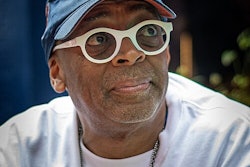Paris Noir
Study abroad program explores historical, cultural, intellectual
connections between African Americans and the “City of Lights”
By Robert J. Vickers


Over the course of American history, Paris has stood out as an intriguing place for African Americans. Josephine Baker renounced American racism along with her citizenship in favor of the more accepting French capital and — while performing as a burlesque entertainer — served as a spy for the French resistance during World War II.
And all through the Harlem Renaissance, countless Black artists and intellectuals temporarily escaped American racism, or permanently relocated there. W.E.B. Du Bois and Langston Hughes both wrote about their experiences in the city. Other authors and poets such as Jessie Fauset and Countee Cullen used the city as a setting for their prose.
Despite these consistent linkages, little academic study has focused on this connection. That changed dramatically two years ago when Dr. Janis A. Mayes, an African American studies professor at Syracuse University, was asked to create a summer study program in Paris to highlight and explore the historical, cultural and intellectual connections between African Americans and the “City of Lights.”
The product was Paris Noir, a six-credit program open to undergraduate and graduate students. The subtitle of the program promotes a study of “literature, art and contemporary life in Diaspora,” but that’s just the beginning.
“I conceptualize it with a kind of jazz structure,” Mayes says. “This way, students with a variety of academic interests can look at the concept of Paris Noir from their own academic interests.”
During the five-week program, approximately 15 students, who are housed at an “apartment hotel,” meet at the famous Café de Flore, visit the Louvre and other renowned museums, and attend lectures by artists, intellectuals and African American expatriates.
Students have met and talked with singer Nina Simone, jazz musician Archie Shepp, sculptor and author Barbara Chase-Riboud and poet Sonia Sanchez, Mayes says.
“They meet everyone there is to meet in Paris who are doing things in a lot of different communities,” she says. “The students are not tourists. They become immersed in Paris’ culture.”
Mayes’ expertise in African Americans’ connection to Paris was nurtured as an undergraduate studying French literature at historically Black Fisk University in Nashville, Tenn. It blossomed at Brown University during her master’s and doctoral studies, and took flight with additional study at the celebrated University of Paris-Sorbonne.
After arriving at Syracuse in the 1980s, Mayes spent much of her time teaching subjects that invariably linked African American and women’s studies, French and literature. Eventually it all came together in a course she created studying Black Paris, she says.
It was just a matter of time before word of her niche made its way around campus.
“The spring after I taught the course, I was contacted by someone from the university’s (international studies office), who asked me to do a summer abroad program like the course,” Mayes says.
Early on, the program focused on African Americans from the 18th century, but it has evolved to look at Blacks from all over the world, their influence on Paris and the influence of Paris on them.
“I realized that even though we are talking about African American life, literature and art, it’s all interrelated with Africa and the Caribbean,” Mayes says.
And even though the program is just entering its third year, it is having an impact on not only the students, but Paris as well.
“The Paris museums had never given tours and lectures from the perspective that I was asking,” Mayes says. “Now they have people at the Picasso and the Louvre and other museums who are developing this specialty.”
The museum experience was particularly moving for Alicia Hines, a 20-year-old Syracuse senior who enrolled in the program in 2002.
Hines says that even though the Louvre has thousands of paintings, only 15 include Black people, according to their tour guide. “The images in those 15 mainly dated back to the 1800s. They were depictions of Blacks as savages. Some of the paintings didn’t even show their face. They were kind of dehumanizing. Those images really disturbed me,” says Hines, a political science and African American studies major.
This experience and others led Hines to re-examine her preconceived notions about Paris and African Americans.
“The main thing is that it changes your whole perspective of self, self living in the United States, and self living in the world,” adds the Washington, D.C., native. “It shows you a different perspective of a Black person.”
For Andre Carrington, a senior African American studies major at Macalester College in St. Paul, Minn., the Paris Noir program had a big influence on the direction of his studies.
“Since then, I’ve taken classes on African and Caribbean literature,” says Carrington, who participated in the first Paris Noir in 2001. “It kicked off my whole interest in broader understandings of ‘Blackness.’ Now, I’m working with a professor on developing a course on African Americans in Paris and my experience played a big role in that.
“It’s a great way to answer some of the questions people have about what ‘Blackness’ means in different places,” he adds. “You can’t get this perspective if you went on your average study abroad program because it really focuses on African peoples.”
Mayes’ unique program also has recruited students from Spelman and Agnes Scott colleges in Atlanta, George Washington University in Washington, D.C., Southern University in Baton Rouge, La., and Hampton University in Virginia.
“I’m very keen on drawing from the HBCUs because of my own experience as an undergrad at Fisk,” Mayes says.
The program, running May 31-July 6, charges a $6,734 program fee and tuition for undergraduates and $7,232 fee for graduate students. Housing and meals are included. Students are responsible for paying their own travel expenses and making their own travel arrangements. According to Anne Timmons, recruitment coordinator in the division of International Programs Abroad, Syracuse offers tuition grants to students based on need.
Students are required to participate in weekly discussions based on assigned readings, lectures and site visits. Students also must make one oral presentation, keep a detailed journal, be tested on the assigned readings and submit a term paper based on the experience. Independent study also is required.
Syracuse promotes the program through their catalog and Web site as well as other online sites such as Studyabroad.com and iiepassport.org.
Mayes says she hopes Syracuse will have the vision to stabilize the program before other schools start trying to emulate it. Last year, Columbia University attempted a similar program, however, it did not get off the ground due to lack of interest, according to Mayes.
As for the future of Paris Noir, Mayes says they are looking to add an internship component to the program, starting informally this summer with one student. “I would like to see a semester program on Paris Noir,” Mayes says. “It would enhance any French studies program. And there’s keen interest.”
Applications for Paris Noir are available at:
© Copyright 2005 by DiverseEducation.com


















